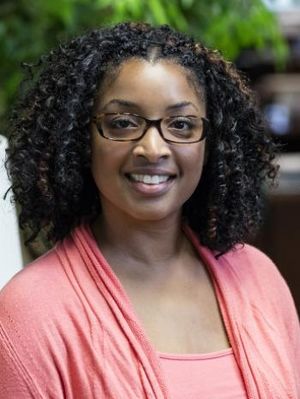Clarice Phelps facts for kids
Quick facts for kids
Clarice Phelps
|
|
|---|---|
 |
|
| Born |
Clarice Evone Salone
|
| Education | Tennessee State University (BS, 2003) US Navy Nuclear Power School University of Texas at Austin (MS, 2020) |
| Scientific career | |
| Fields | |
| Institutions | Oak Ridge National Laboratory |
| Military career | |
| Service/ |
United States Navy |
| Unit | USS Ronald Reagan |
Clarice Evone Phelps is an American nuclear chemist who studies and processes special radioactive elements at the US Department of Energy's Oak Ridge National Laboratory (ORNL). She was part of the ORNL team that worked with another group to discover tennessine (element 117). The International Union of Pure and Applied Chemistry (IUPAC) has recognized her as the first African-American woman to help discover a chemical element.
Before working at ORNL, Phelps was in the US Navy Nuclear Power Program. At ORNL, she helps manage programs that look into how elements like nickel-63 and selenium-75 can be used in industries.
Contents
Clarice Phelps: A Nuclear Chemist
Early Life and Education
Clarice Phelps grew up in Tennessee, USA. Her interest in chemistry started when she was a child. Her mother gave her a microscope and a science kit, which sparked her curiosity. Her science teachers in high school also helped her love for science grow.
Phelps went to Tennessee State University and earned a Bachelor of Science degree in chemistry in 2003. Later, from 2016 to 2020, she earned a Master of Science degree in mechanical engineering from the University of Texas at Austin. As of 2021, she is working on her PhD in nuclear engineering at the University of Tennessee.
After college, Phelps joined the United States Navy. She enrolled in the Navy's Nuclear Power School, which taught her how to study effectively. She learned about nuclear power, how reactors work, and thermodynamics (the study of heat and energy). She graduated as one of the top students in her class.
Phelps served as a non-commissioned officer in the Navy's Nuclear Power Program. She spent four and a half years on the aircraft carrier USS Ronald Reagan. On the ship, she helped operate the nuclear reactor and managed the chemistry of the steam generator. She was deployed twice during her service.
Working at Oak Ridge National Laboratory
After leaving the Navy, Clarice Phelps joined Oak Ridge National Laboratory in June 2009. She started as a technician and was later promoted to research associate and program manager.
Phelps works with "super heavy" elements called transuranic isotopes. These are made mainly through a process called nuclear transmutation. She also researches other elements like actinium, lanthanum, europium, and samarium.
Discovering a New Element
Clarice Phelps played a role in discovering tennessine (element 117), which is the second-heaviest known element. She was part of a three-month process to purify a tiny amount (22 milligrams) of berkelium-249. This berkelium was then sent to the Joint Institute for Nuclear Research. There, it was combined with calcium-48 in a special reaction to create tennessine.
The International Union of Pure and Applied Chemistry (IUPAC) recognized Oak Ridge National Laboratory as a main co-discoverer of tennessine. They acknowledged 61 people at ORNL who helped with the project, including Clarice Phelps. IUPAC recognized Phelps as the first African-American woman involved in the discovery of a chemical element.
When ORNL held a celebration for the team that discovered tennessine, Clarice Phelps's name was initially left off the list for a special plaque. After she worked to have her contribution recognized, her name was added to the plaque.
Phelps has also contributed to other research projects. This includes studying plutonium-238 and neptunium-237 for NASA. She has also studied a process called electrodeposition with californium-252.
Inspiring Others
Clarice Phelps is very involved in projects that encourage young people to join fields like science, technology, engineering, and mathematics (STEM). She is part of ORNL's Educational Outreach Committee. She has helped create programs to teach high school students about robotics, drones, and coding. Phelps is also the Vice President of a group called Youth Outreach in Science, Technology, Engineering and Mathematics (YO-STEM).
Phelps received the 2017 YWCA Knoxville Tribute to Women Award for Technology, Research, and Innovation. This award honors local women who are leaders in technology and serve their communities.
In 2019, IUPAC featured Phelps in the Periodic Table of Younger Chemists. This was to recognize her dedication to research and her work in inspiring the public. She was also honored for being an important supporter of diversity in science. Phelps is linked to the element einsteinium on this special periodic table.
In December 2019, Phelps gave a TEDx talk called "How I Claimed a Seat at the Periodic Table." In her talk, she shared stories of women of color succeeding in science. She also discussed how important it is for everyone to be recognized for their contributions.
Images for kids
 | Selma Burke |
 | Pauline Powell Burns |
 | Frederick J. Brown |
 | Robert Blackburn |


